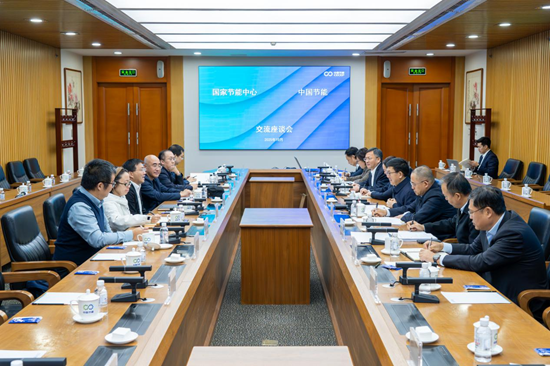On October 22, Liao Jiasheng, Chairman of the Group, held a working meeting with Liu Qiong, Director of the National Energy Conservation Center, at the Group’s headquarters. The two sides conducted in-depth discussions on topics including energy conservation and carbon reduction policies during the 15th Five-Year Plan period, the establishment of the dual-carbon institutional system, and key directions for energy-saving and carbon-reduction development. Liu Dajun, Deputy Secretary of the Group’s Party Committee, and Kang Yanbing, Deputy Director of the National Energy Conservation Center, also attended the meeting.

Liao Jiasheng extended a warm welcome to Liu Qiong and her delegation and expressed sincere appreciation for the Center’s long-term guidance and support for CECEP. He outlined CECEP’s recent progress and development plans for the 15th Five-Year Plan period. He noted that as a central enterprise focused on energy conservation and environmental protection, CECEP has earnestly implemented Xi Jinping Thought on Ecological Civilization and actively served major national strategies. With extensive practical experience in energy conservation and carbon reduction, CECEP sees broad opportunities for cooperation with the National Energy Conservation Center in areas such as top-level design of the green and low-carbon industry, zero-carbon park development, potential assessment of energy conservation and carbon reduction in central SOEs, and the establishment of energy and carbon data platforms. Liao expressed CECEP’s hope to strengthen communication and deepen collaboration with the Center to contribute more significantly to China’s green and low-carbon transformation.
Liu Qiong thanked CECEP for the warm reception and introduced the recent reform and development progress of the National Energy Conservation Center. She noted that as a public institution directly under the National Development and Reform Commission, the Center has long been engaged in policy and regulation research on energy conservation and carbon reduction, energy efficiency assessment of fixed asset investment projects, and management of energy efficiency labeling, establishing a solid foundation for cooperation with CECEP. She expressed hope that CECEP would leverage its strengths in platforms, resources and application scenarios related to energy conservation and carbon reduction to collaborate more deeply with the Center in policy research, standard formulation, technology promotion and project implementation, jointly advancing China’s dual-carbon goals.
The meeting was also attended by heads of the Office, Review Division, Energy Conservation Management Division, and Dual-Carbon Policy Research Division of the National Energy Conservation Center, as well as leaders from CECEP’s Strategy Department, Science and Technology Department, Cooperation Department, CECEP Building Energy Conservation, and Research Center.